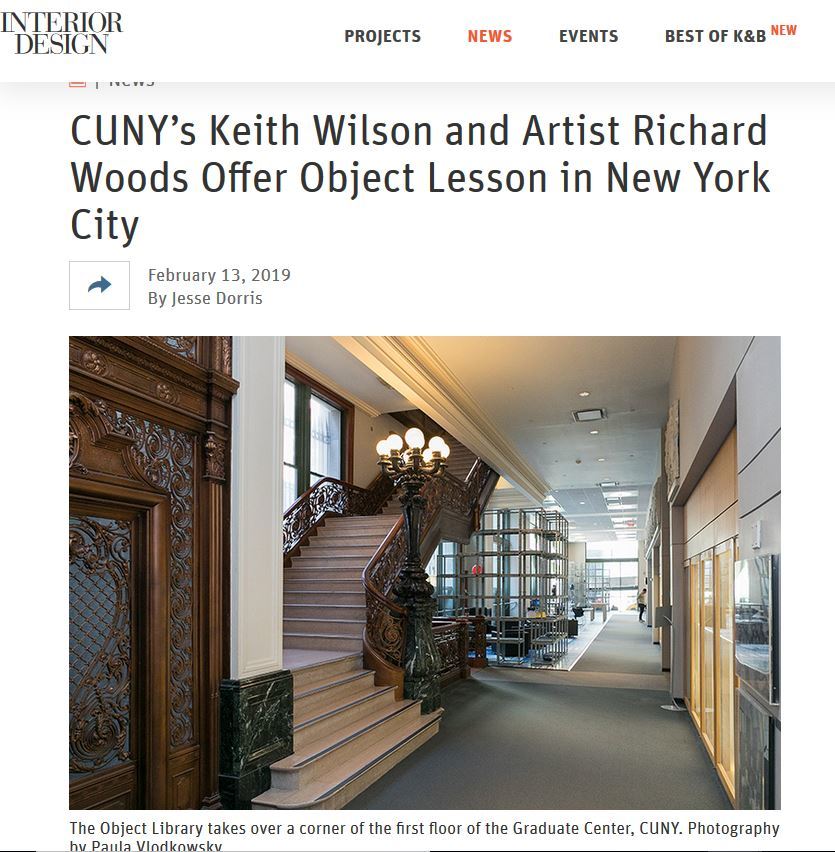About
The Object Library was a collaborative, participatory installation located on the first floor of Mina Rees Library at The Graduate Center, CUNY in midtown Manhattan in 2017–20. Somewhere between a sculpture gallery and a library, The Object Library offered material artifacts as starting points for conversation and shared speculation, while selected programming engaged the public with the scholarly research and wider activities within and outside of the Graduate Center’s historic building on Fifth Avenue.
The project launched in 2017 with the installation of a set of plaster casts of the marble carvings that originally ran in a strip around the upper walls of the Parthenon (the temple to the goddess Athena atop the Acropolis), fabricated by the British Museum in the early 19th century. On long-term loan from CUNY’s City College, where they had originally been used to teach art and art history for more than 100 years, the sculptures now adorn the Graduate Center’s lobby and library.
The Object Library’s iterative installation, 365 Things, consisted of a steel-framed structure filled with various objects donated by the Graduate Center community, alongside curated programs on related themes. Inspired by Things, a participatory project presented by artist Keith Wilson (director of the Center for the Humanities, 2017–22), at the Wellcome Collection in London in 2010, and Calendar, an exhibition at the MAC Belfast in 2016, 365 Things conveyed a taste of what goes on inside the Graduate Center, the doctoral-granting campus of the City University of New York.
The structure was complemented by Logo 161, a visually striking block-printed floor installation by Richard Woods Studio that reinvented the wood pattern of the original B. Altman & Co. department store floor in shades of blue. Several showcases throughout the space highlighted the activities of the Graduate Center community outside of the building, which were accompanied by related programming, including seminars and events, that brought these wider activities to life.
In collaboration with Wellcome, the project also resulted in a multiyear residency program, which hosted artist Mariam Ghani and subsequently documentary filmmaker Virginia Heath. Each worked with an interdisciplinary group of Graduate Center students to produce projects: Ghani produced a film, entitled Dis-ease, about illness and contagion for Wellcome’s Contagious Cities project; whereas Heath’s docufiction film on vaudeville and Hollywood starlet Mae West, Mae West: Boxer in a Corset, has already achieved critical acclaim. Wellcome’s relationship with the Graduate Center and the Center for the Humanities continued with the appointment of postdoctoral fellow Rebecca Hayes Jacobs, New York project lead on Wellcome’s international Mindscapes project (2019–23), including artist residencies, exhibitions and events on the theme of mental health.
In the Press:
Read about The Object Library at the Graduate Center, CUNY and collaboration with artist Richard Woods in Interior Design Magazine:
“What do we want from a library these days?” Sculptor Keith Wilson is exploring this question as director of a new initiative for the Center of the Humanities at the Graduate Center, CUNY. Called the Object Library, it’s a collection of wares and goods, as well as books, that Wilson says will “point to other ways we can learn about the world.” Read the full article here.

Release/Fine print:
We invite members of the GC community, as well as the general public, to donate one object to the Center for Humanities’ 365 Things project ––a dynamic and evolving art installation originated and curated by the Center’s Director, sculptor Keith Wilson.
When you contribute your one thing––no bigger than your head––to the 365 Things project, your non-deductible donation becomes part of the research resources of The Object Library. By donating your thing and story to the project, it becomes a constituent part of The Object Library, and you agree––without restriction or objection––to their use for future research and display, which may include their use in facilitated events, classes, and an online catalog.
Due to the public nature of the project, and how we anticipate the public will engage with the objects, we cannot guarantee that your thing will be returned to you at the conclusion of the exhibition.
Thank you in advance for your support of this creative effort and for sharing your story and your thing.